LacLaBiche, Alberta: Moving to the Edge of the Wilderness
July, 2011. The Aurora Theatre, in downtown LacLaBiche looks exactly as it did when Louise and I attended the Saturday matinee’s in 1952-53. The Gypsy Family McNeill, after 11 moves in 11 years, had landed LacLaBiche. (The Aurora story appears in Chapter 4, below). Sadly, the theatre closed in 2014.
Link to Next Post: The Journey Begins (First of Part VI)
Link to Last Post: Pibroch
Link to Family Stories Index
Feb 4, 2017 (2900)
Sept 4, 2017 (3047)
Chapter 3: Gypsy Years, LacLaBiche
Introduction
With moving to different homes once or twice a year in each year of our short lives, Louise and I were becoming old hands at the practice. While each move provided new adventures, there was still plenty of uncertainty. What would the school be like? Would the kids be friendly? How about the teachers? How far from our home?
While it was always a comfort to be with Mom and Dad, this year would see more change and another separation on the horizon. Even Louise and I would end up going in different directions. For me, it would create a personal crisis of immense proportion.
Dad continued his practice of finding new things to challenge me when he decided to ship me into the wilderness for a little more “life experience”. And, while talking about life experience, as Kenneth (my Grade 5 friend and soulmate) and I grew towards our teens, we suddenly discovered ‘girls’. And, an awesome discovery.
Join Louise and me as we tackle life in LacLaBiche in the early 1950s. Photos for this post may be linked at: McNeill Life Stories Facebook Page Additional photos will be added as they become available.
1. Off to LacLaBiche, Alberta
With the sale of the Murfitt farm in Pibroch (link to Pibroch) on the horizon, Dad began his search for a new job and home for the family. For one year we enjoyed the total engagement that comes with living on a successful farm filled with all things beautiful – fresh air, land, animals, family, friends, hard work, a sense of purpose and a peace of mind that often eludes those harnessed to the hustle and bustle of the city. As Dad and Mom were defined by a wilderness style of living that required a high degree of self-sufficiency, the thought of moving back to Edmonton to find work would be a bitter pill to swallow.
During our time in Edmonton, Dad often commercial fished at LacLaBiche, both in his own right and for the owner of the mink ranch where he worked in Edmonton. He also knew a lot of people in that small northeast Alberta town, as he and Uncle Warren (the second husband of his sister Liz (Harwood)) often traveled there to buy mink when the two of them ran the Mink and Fox Ranch on the north shores of Cold Lake in the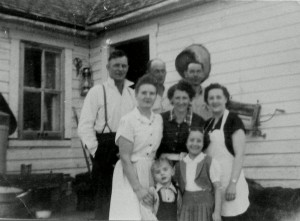 late 1940’s (Link Smith Place).
late 1940’s (Link Smith Place).
The gregarious sort he was, Dad likely met a number of people and later struck a deal with one of them. In mid-July, while still in Pibroch, he told us we would be moving there as he intended to again take up mink ranching. By early August the transition was complete and we were settling in.
Photo I1952 (Mom’s Brownie Camera): At our first home in LacLaBiche. Top Dad, Dave McNeill, Uncle Art Shirrmacker, and August Gatzke. Middle, Edna Gatzke, Aunt Pat Shirrmacker (nee McNeill) and Mom, Laura McNeill (Wheeler). Bottom, Youngest Gatzke (perhaps Larry) and Louise McNeill (Yochim) More pictures in attached album.
While leaving the farm was disappointing to Mom, Louise and me after having fully reunited in Pibroch, it was also exciting as Dad’s sister, Patricia Shirrmacker (McNeill/Humphries) (link), her husband Art and three children, our cousins, Gary, Merve and Ellen, lived on a farm just a few miles east of town. Also, close friends of Mom and Dad from the early days in Cold Lake, August and Edna Gatzke, now lived in LacLaBiche with their four children, David, Clara, Kenneth and Terry. It would not be many months before the Gatzke family would come to play an important role in my young life.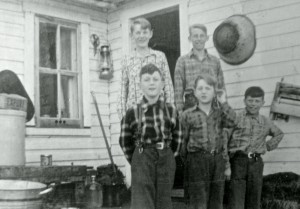
Photo (1952, by Mom) Top, David Gatzke, Gary Shirrmacker, Bottom, Harold McNeill, Kenneth Gatzke and Merve Shirrmacker. Photos were all taken on the same day, not long after we moved to our new home. The three families had many parties over the coming months. A photo of second oldest child, Clara, is included in the attached photo album.
After a couple of weeks we were settled in at a small cottage on the sparsely settled west shore about five miles by road from town. It was a great location as we were again close to the water and that meant a beach, swimming and fishing in the summer, something that was a big part of our early lives. But, the coming year would also bring new challenges that would see Louise and I separated for the first time in our lives and my struggling to control a common childhood problem that caused me immense anguish.
2. Home Life
The cottage, set back on a hill about 200 yards from the lake, provided a beautiful view across a bay toward the government dock and west side of town. While the cottage was only sparsely furnished with whatever Mom and Dad were able to bring from Pibroch, extra furnishings and household essentials were purchased in town or borrowed from the Schirrmacker’s and Gatzke’s. It was a ‘catch as catch can’ life style that we had lived over the past decade.
Mom still did not yet have her knickknacks, as Dad was not in a position to pick up any belongings that were still in Cold Lake. Perhaps that was just as well, as we never seemed to be settled long enough to make it worthwhile. In my short life we had made twelve moves in twelve years, four of which Louise and I spent living with relatives on one side of the family or other. Our stored belongings now included everything willed to our family by Mr. Goodrich who passed away the previous winter while in his home at Marie Lake. The last time we saw him was during a visit he made to Edmonton in the winter of 1950.
I think Mr. Goodrich, the lifelong, self-sufficient, bachelor-trapper he was, found it very lonesome after the two children with whom he had become so close as neighbors at Marie Lake, had moved away. Even the dog left in his care for several months had been killed before his very eyes after running away from our home in Edmonton and returning to Marie Lake. I cannot imagine how difficult that must have been for him. While this was all very sad, there were still many positives in our lives.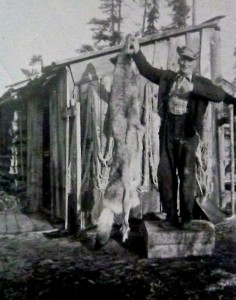
Photo (by Mom): Mr. Goodrich holds up a wolf pelt taken drink the previous winter.
During our time in LacLaBiche, I do not recall Mom taking an outside job. That was good news for Louise and me as we had her pretty much to ourselves when we were home. Because she was a born teacher, she was always there whenever we needed help with our schoolwork and, of course, always asked us to ‘help’ her with the cooking and baking.
In LacLaBiche, I was less involved with Dad’s affairs as I had been when living at Marie Lake. That was fine, as Mom was always doing something interesting. She would ‘preserve’ everything she could get her hands on and in her ‘spare’ time would sew, knit and crochet to her hearts content. No family member or friend ever went without, as Mom was always making something for someone. By Christmas she always had a stock pile of goodies to pass around.
Dad of course was also a working fool. Whoever was fortunate enough to gain his services was indeed a lucky person. While we still had quality time with him, he worked long hours and, as was a growing habit, spent a good deal of time with buddies at the LacLaBiche Hotel bar.
One of his work downfalls, as far as I can recall, was his strong headedness and belief that he could handle any situation without needing instructions or suggestions from anyone. He was not a man born follow. This did not go over so well with some employers or partners as Dad would simply do whatever he thought best.
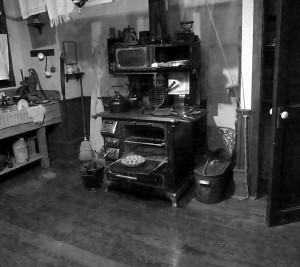 Sometime that fall we made a quick move from the cottage into the main house, a much larger place, with three bedrooms and an even better view of the lake. I think that was the first time in our lives, Louise and I had a bedroom of our own. One incident in that the house always sticks out in my mind, partly because of what happened to Mom at Marie Lake (link Explosion) and partly because it was extremely lucky Dad was not seriously injured.
Sometime that fall we made a quick move from the cottage into the main house, a much larger place, with three bedrooms and an even better view of the lake. I think that was the first time in our lives, Louise and I had a bedroom of our own. One incident in that the house always sticks out in my mind, partly because of what happened to Mom at Marie Lake (link Explosion) and partly because it was extremely lucky Dad was not seriously injured.
After our move, one of Dad’s brother’s (I’m quite sure it was Floyd McNeill) was visiting and the two spent several hours drinking at the bar. On the way home, the car stalled and in an effort to get it started Dad primed it with some gas he had siphoned from the tank into an empty beer bottle (see photo in footer)
As it was cold outside and both were ‘half cut’, Dad mistakenly took a swig or two from the gas bottle. Although he gagged he did not immediately vomit after cleansing his mouth by drinking a bottle of beer. The man had a strong constitution. Eventually the car was started and the two completed the trip home.
Seconds after stepping into the warm air of the house and as he walked by the kitchen wood stove (similar to the type on the left), he began to heave. With no time head outside or find a bucket, he lifted a lid on the stove and vomited. Big mistake! A split second later it exploded blowing all the lids off the stove. The flash of flames singed Dad’s hair and eyebrows, but thankfully did not do any other damage. I’m sure you understand why this episode is etched in my mind after all these years.
3. Back to School
A few weeks after we settled in, Louise and I headed off for our first day at school. The process of making new friends and becoming used to the teachers would begin all over. Although we were becoming old hands at this, it was still a time filled with uncertainty as both of us could still be described as ‘bushed’. While our year in Edmonton had smoothed off some of the rough edges, we were still more comfortable in one-room country school with one teacher.
While the trek to school in Pibroch was about two miles each way, for the trek to LacLaBiche we had one choice in the summer (around a shoreline trail, about 3 miles) and in the winter – either along same trail or across the lake after it froze over. The winter walk across lake to the Government Dock cut about one and one-half miles off the trip. A very enticing alternate – except…
Taking the lake crossing meant facing the regular bitter cold wind and occasional blizzard. During those times it could be downright miserable and by the standards of today, probably dangerous. I don’t think Mom liked letting us walk on those cold, miserable days, 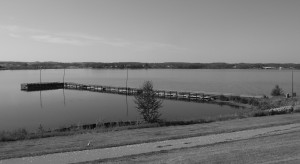 but there was no school bus and few other options. Besides, any objections she might have would just be pooh poohed by Dad.
but there was no school bus and few other options. Besides, any objections she might have would just be pooh poohed by Dad.
Photo (Web): The Government Dock in LLB looking West across the bay towards the shoreline on which we lived. Our home was on the far right, a distance of about 1.5 miles. This is the dock to which we walked during the winter when on our way to school (reference map below).
On the really cold days (-20 or more), even when warmly dressed the cold would cut right to the bone. While the shoreline provided some shelter from the wind, we were not eager to walk the extra distance as those short northern days meant it would be dark during part of the walk to and from school. When crossing the lake we could usually make it in daylight.
Although Louise was just a little squirt, she was a trooper of the first order. Dad did not have to tell her to go to school, in fact, even if he said no she would likely have gone anyway. It seems she might have picked off a few of his ‘independence and strong headedness’ genes. I was never as powerful with Dad.
That winter Louise often walked with neighbourhood friend, a little girl in her class. The girl would stop by and the two would head out into the bitter cold. Sometimes I walked with them, sometimes not, depending on whether I got out of bed in time. It seems her little friend never had a good winter parka, so one day the poor girl was nearly frozen before they were half way across the bay. Without a second thought, Louise stopped peeled off her parka and traded with her friend. They completed the rest of the trek.
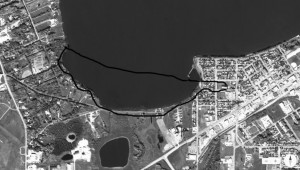 As Louise had not one ounce of extra fat on her body they were both nearly froze by the time they reached school. I suppose someone must have taken finally taken notice, probably Mom, and found a parka for that poor little girl. This trait of helping others, even at the expense of her own comfort or well being, came to define my baby sister both in her school years and throughout her adult life.
As Louise had not one ounce of extra fat on her body they were both nearly froze by the time they reached school. I suppose someone must have taken finally taken notice, probably Mom, and found a parka for that poor little girl. This trait of helping others, even at the expense of her own comfort or well being, came to define my baby sister both in her school years and throughout her adult life.
Map (Web). The black line shows the trail around the lake shore along with the path the path for crossing the bay in the winter.
After moving from the one room school in Pibroch, Louise and I were again in different classrooms as we were in Edmonton. From that point we more or less lost track of each other at school as our interests and friends were different. I know she always came in at the top of her class, a standard from which she never wavered. I was not nearly as attentive to my studies, but just the same Grade 5 was going great.
I become friends with Kenneth Gatzke, one of the four children of August and Edna who we often visited. The other three children were in the same school, but different grades – David and Clara in higher grades and Larry at least a year earlier. Also, of our cousins Gary was a bit older than me and in a higher grade and his brother, Merve and sister Ellen in lower grades.
One day as Kenneth and I were lollygagging on our way back to class from the outdoor toilets (yes, it was still an outdoor system), the teacher must have watched through the window as she met us at the door with her school issue leather strap in her hand. After scolding us about being late, she told us to hold our palms face up. She then laid a solid whack across each palm. It stung and with red palms and red faces, we entered the class. The system of corporal punishment was alive and well in LacLaBiche and other schools across Alberta (I).
This incident still stands out in my mind as being extreme for such a trivial incident. Both Kenneth and I were generally respectful, hard working students, but were at an age where minor transgressions took place, particularly among the boys. From that day forth, I did not like the teacher and whenever I could torment her without getting caught, I would do so. Somehow I managed to complete the year without getting caught.
(1) On the home front Mom and Dad set a much better example on how to discipline without the use of physical violence. I do not recall either Louise or me ever having been given a spanking and on those occasions when we were deserving of punishment, Mom and/or Dad always found a better way (reference the Fire Tower incident). I suppose that is why I do not recall ever resorting to a spanking with my own children even when they sorely tested me.
4. The Movie Matinee
A highlight each week was meeting schoolmates for the Saturday afternoon matinee at the Aurora Theatre on Main Street. The silver screen had expanded in leaps and bounds over the previous decade and Technicolor was now the order of the day. The theatre even featured the occasional 3D movie with glasses much like those used today. In some ways I think the 3D was even better then, than now.
The 150-seat theatre was always filled to capacity well before the first reel began to role. When the lights dimmed, the place would go quiet as the first of two or three Looney Tunes, from a selection of Bugs Bunny, Daffy Duck, Porky Pig, Elmer Fudd, Sylvester, 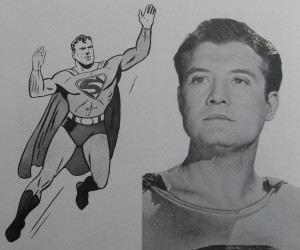 Tweety, Wile E. Coyote, the Road Runner and others, rolled across the screen.
Tweety, Wile E. Coyote, the Road Runner and others, rolled across the screen.
Immediately following came a twenty-minute episode of the Superman then played by George Reeves (no relation to Christopher Reeve). Superman was a captivating character who held a place in every boy’s dreams. As for the girls, they liked Superman, but would have to wait another ten years before Supergirl, Superman’s cousin, would be introduced to the silver screen.
Hollywood was at the beginning of a hay day that would extend over the next two or three decades as it poured out an endless stream of movies. For the kids, slapstick horrors like Abbott and Costello meet Frankenstein and Westerns with Hop-a-long Cassidy, Roy Rogers and Dale Evans, Rex Alan, Gene Autry and a host of others, kept us enthralled. Adults were certain that by becoming glued to the silver screen on Saturday afternoon, kids of the day would be permanently damaged. Television, which just beginning in the larger cities, was also earning the enmity of the older generation.
Because we were just entering that awkward age when boys and girls were beginning to really notice the difference, the theatre was a great place for getting close, perhaps even holding hands with that ‘special someone’. It is a magic time of life. I can still remember those Valentine books with pre-cut cards that we would carefully remove, fold, sign and place in an envelope for every classmate? For those ‘special’ persons, there were even a few larger cards in the back of the book. What better way to say “liked” to someone than to say it with a Valentine card.
As for the old movie house, when on a trip to LacLaBiche in 2010 with our son Jay, we found the Aurora Theatre was now operating under the Cineplex banner. It looking exactly as it did sixty years earlier (lead photo). When we took in an evening show and told the staff it was my favourite place back in the fifties, they proudly showed us around and pointed at the plush new seats that had recently been installed. After grabbing popcorn, we settled in for the movie and I drifted back to that awesome Grade 5 year (1).
(I) After posting this story last week, I received a call from LacLaBiche advising me the theatre had closed it’s doors for a final time. It seems the cost of installing the new equipment needed to show the movies being produced today was prohibitive.
5. Sea Cadets
Another highlight was the weekly Navy Cadet training. Shortly after we arrived in LacLaBiche, mom registered me with the LacLaBiche division where Kenneth was also registered. I was able to spend nearly a year in the program and loved it. We were issued real uniforms complete with bell-bottom pants and skintight jerseys with a blue-stripped bib and lanyard down the front. The iconic, hard brimmed, circular seaman hats were the bane of every entry-level cadet. Part of the rite of initiation was having the 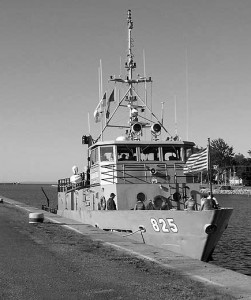 older cadets shout orders and if anyone did not respond exactly as ordered, the older cadet would push that hard brimmed hat down on the bridge of our nose and give a good bang. That really hurt.
older cadets shout orders and if anyone did not respond exactly as ordered, the older cadet would push that hard brimmed hat down on the bridge of our nose and give a good bang. That really hurt.
Of the many delights at cadets was learning seamanship on an honest to goodness navy style, miniature ship moored at the Government Wharf. The photo on the left (Web) is a good representation of our ‘ship’. It was actually more of a large boat, but came complete with all the standard navy equipment where we would often spend a weekend learning the ropes. Of course those ropes included learning to tie dozens of different types of knots that were standard navy.
Photo (Web Shot). In LacLaBiche the boat may have been named the “Father McGrane” after the original leader of the Cadet Group. Another member of the Gatzke Family, Terry, provided this background. Terry also wore the cadet uniform when he was 12. He recalled the troop also practiced shooting with 22 rifles at the training center across the lake (Detail provided, February 24, 2014, via Facebook). Link Here for a LacLaBiche Post Article of April 2011 on the history of the boat. (1) February 26, 2014. Information received from Shirley at the Lakeland Interpretive Society, that the Empress of France (name of boat) has now been fully restored and will be on display at the Vancouver Marine Museum starting on April 11, 2014. Thereafter, the boat will be returned to LakeLaBiche where it will be put on display. The Grand Opening is scheduled for May 17, 2014. Contact may be made with the Interpretive Society at 780-623-1727 for further details.
As well as marching and close order drills, every cadet was also obliged to learn Morse code. I don’t recall getting much past knowing it was made up of various combinations of dots and dashes. Another special time was attending the Squadron Cadet Camp on the west shore of the lake. That camp was busy all summer as it served squadrons from as far away as Edmonton and all points in between. For the longest time, Mom had a couple of pictures of me in uniform, but they seem to have disappeared in the mists of time. (1)
(1) Following conversations after posting this story, it seems the boat that I remembered was different from the one being returned to LacLaBiche. There may have been another boat, but I rather suspect the mists of time have clouded my memory of the boat we used for training purposes. It was likely the Empress of France.
6. Out of School Again
In January or February, Dad paid one of his infrequent visits to my teacher. He told her (he never asked) he was taking me out of school for a couple of weeks as there was an opportunity for me to travel north to learn more about trapping and hunting. She could send some homework, but he thought the days would be long and did not think I would have much time for books. I was not all that thrilled, as I would miss both the Saturday Matinee and Cadets, but once Dad had his mind set there was little use arguing. I needed Louise’s gumption. She would just to put her foot down and say: “No, I’m not going.”
The next day with my winter gear packed, we were off to the railway station to meet the old trapper I would be traveling with. I do 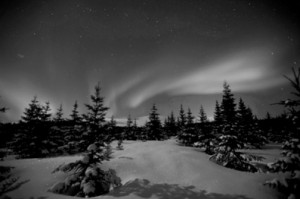 not recall his name so for this story will him ‘Trapper John’. I say he was old because having just turned twelve, anyone over the age of thirty-five or forty was so old it was hard to imagine. As it was late that afternoon when we boarded, it was clearly going to be pitch black by the time we arrived.
not recall his name so for this story will him ‘Trapper John’. I say he was old because having just turned twelve, anyone over the age of thirty-five or forty was so old it was hard to imagine. As it was late that afternoon when we boarded, it was clearly going to be pitch black by the time we arrived.
Photo (Web). The long cold nights in the far north often provided an amazing display of the dancing Northern Lights. The ebbing and flowing Northern Lights that often accompanied a full moon in mid-February made for good visibility as long as we were not in the midst of a blizzard.
I was nervous. I had never ridden on a train and although Trapper John was a friend of Dad’s, I did not know him from Adam. I hoped he had a better sense of humour that the old guy I worked with during that harvest in Pibroch. I figured if he had the same temperament, I might just walk out. To be fair, I don’t think Dad would ever send me with someone he didn’t totally trust.
Our passenger car was linked among several freight cars and the cold wooden seats did not provide much comfort. Even though the car was cold, it was not long before we settled to the steady click-clack of steel wheels on frozen rails. I was nearly asleep, but became distracted.
A woman holding a baby and seated across from me, were both sleeping soundly, but suddenly the baby woke and began to cry. Soon after the woman did something that startled, yet fascinated me. She calmly undid her parka and heavy shirt, brought out a breast and began to feed. A few minutes later she changed breasts. She made no attempt to conceal what she was doing and while I certainly knew women nursed babies, among our family and friends none ever openly nursed in front of the kids or other adults (as far as I can recall). I tried to keep my eyes diverted, but that was clearly impossible. Job finished, the breasts were tucked away and shortly after, both mother and baby were soundly sleeping.
By that time the back of the car was rocking. Several men had brought liquor onboard and were well on their way to being drunk. They were likely headed to one of the camps around Fort McMurray and were getting in some last minute party time. I believe the conductor spoke to them a couple to times, but imagine he considered it an impossible task as alcohol, drunkenness and rowdy behaviour defined the behaviour of the men from those remote camps where on holidays.
Two or three hours after boarding, with the party still going strong, the train stopped. We grabbed our gear and jumped off at one of those nowhere points. The small railway sign read “Conklin”. It was a whistle stop community with two or three building whistle stop community about half way between LacLaBiche and Fort McMurray.
It was clear, cold and crisp night with nearly a full moon. The bright moon brightened the northern night to an almost daylight standard and in the background I could hear a pack of dogs barking wildly. Clearly they were expecting someone and sensed the old 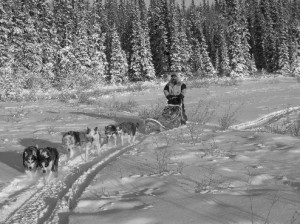 trapper had come to pick them up. Earlier he told me that when he was heading out to LacLaBiche several days earlier, he left his dogs with a man who ran the Conklin store. Sled dogs used to working hard being cooped up for a week or more in a compound left them in fit to be tied.
trapper had come to pick them up. Earlier he told me that when he was heading out to LacLaBiche several days earlier, he left his dogs with a man who ran the Conklin store. Sled dogs used to working hard being cooped up for a week or more in a compound left them in fit to be tied.
Photo (Web Shot): The dogs, sled and territory East of Conklin is much like that featured in this photo. Between LacLaBiche and Fort McMurray, the trees in the muskeg tend to be very short and appear stunted (as opposed to those on the BC Coastal mountains). They provide a different kind of beauty in the short summers and long, hard winters.
While sled dogs are extremely well trained, after a week off these dogs were so anxious to get back in the traces, it was hard getting them settled down long enough to get them harnessed and hitched the sled. After John had me securely tucked in among the gear and food on the sled, we tracked east through the bush toward Christina Lake and his trapping territory. Although it had snowed, the trail was still easy to follow through the trees and scrub brush. Under the bright moon it was a winter wonderland and I was so comfortable with the furry hood of my parka tucked around my face, I was was soon sleeping soundly.
I don’t know what time we arrived at the cabin, but John soon had a fire roaring and the place was thawing out lickity split. The next morning, when I walked outside you could hardly see the cabin as drifted snow on the low-lying roof nearly covered the whole structure. What I could see was similar in style to the cabin in which our family lived at the logging camp at Primrose Lake, northeast of Cold Lake. Although this one had a dirt floor, it was a solid structure built with peeled logs and caulked with moss. Although it 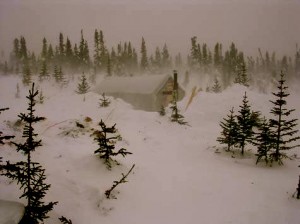 held the heat well, after the fire went out at night all water and foodstuffs would be frozen solid in the morning.
held the heat well, after the fire went out at night all water and foodstuffs would be frozen solid in the morning.
Photo (Web Shot): Trapper John’s cabin (slightly smaller than this) was tucked in among the tree’s and almost covered with snow.
All my concerns about this man vanished over the first couple of days as he was soft spoken and of gentle of character, not unlike Mr. Goodrich. He seemed to really enjoy my company and took every opportunity to teaching me not only how to survive, but how to really enjoy the wonders of living in the wilderness.
The next ten days whizzed by as I again became accustomed to trekking through the bush or, when checking the outer reaches of his trap line, riding on the dog sled. Dogsledding was an entirely new experience, which I found totally exhilarating, as the dogs were friendly, high energy and such worthy companions in the wilderness. I doubt any larger animal would dare cause a problem on the trail or around the camp with all these dogs around barking, yelping dogs around. I expect they were also fiercely protective of their master.
The owner of the mink ranch where Dad worked in LacLaBiche had a team, but he kept them chained up down by the lake most of the year and they never seemed very friendly so I mostly stayed away. I suppose being chained up much of the year by an owner who did not seem to care for or use them, left them with sour dispositions. It was a pretty ugly life compared to lives of Trapper John’s dogs.
While I learned a lot with Trapper John, it helped that I was familiar with being in the bush and with many of the techniques used. Mr. Goodrich, our friend and neighbor at Marie Lake, had spent considerable time teaching me many of the tricks of the trade and I even had my own little trap line (Link here, The Trap Line). New to me was setting larger traps for bear and other animals such as fox, wolf, and lynx that were plentiful in this area. I don’t recall our catching any during my time on the line, but I do remember those big leg hold traps were dangerous things and had heard of stories of men being severely injured or killed if they were not careful. It is good they were eventually banned in Canada.
New to me was setting larger traps for bear and other animals such as fox, wolf, and lynx that were plentiful in this area. I don’t recall our catching any during my time on the line, but I do remember those big leg hold traps were dangerous things and had heard of stories of men being severely injured or killed if they were not careful. It is good they were eventually banned in Canada.
When my ‘work experience’ came to an end about ten days later, we bade farewell, he put me back on the train and I headed back to civilization. Mom was greatly relieved, as I don’t think she wanted me taking so much time off from school, but Dad had no concerns what so ever. To him, learning to be self-sufficient was just as important as book learning. I was soon back in my regular routine of school and the highlights of the week and weekend — Sea Cadets and a Saturday Matinee at the Aurora Theatre.
7. A Bombshell in late February 1953
Two or three weeks after I returned from the trap line trip, Dad told us that he, Mom and Louise were leaving for Cold Lake. “Oh, and Harold”, I wondered: “What pray tell, does fate hold for him?” It turned out I would be staying in LacLaBiche until the end of the school year and living with the Gatzke’s. I was stunned and on the verge of tears. How and why this move came about I have no idea, but knowing my Dad, I’m sure he must have ended up in a disagreement with his partner and decided it was time to pull a pin. Dad was not in any way, shape or form a company man (other than, perhaps, his own company when it came to work).
Also, in the early 1950’s, Cold Lake was the place to be as dozens who left during the lean years were now returning. The new RCAF Station was rapidly expanding and this created a mini boon. When I later heard that Dad had been offered a job skidding logs with horses at Primrose Lake (site of the new bombing range) I knew it was an offer he could not resist. Horses and logging were something deeply imprinted on the very core of my Dad’s soul.
Although the Gatzke’s were family friends and Kenneth and I were close, it was not the same as living at home. It seems that Louise wasn’t out of the woods either. For the remainder of the school year she would be camped with another family friend, Hatty Wells, who lived in Cold Lake. I did not know Mrs. Wells, but I know Louise became very fond of her during the few months she lived with her.
While I was somewhat used to being without Mom and Dad for long periods, this would be the first time in my life I would be without my baby sister. That really hurt as we had become best friends while living in the wilderness and in recent years always 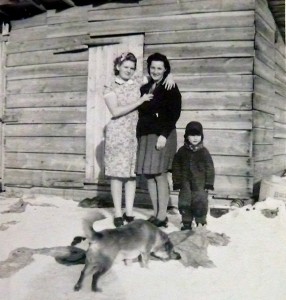 depended upon each other for comfort when Mom and Dad were gone.
depended upon each other for comfort when Mom and Dad were gone.
Photo (on mom’s Brownie). Mom and her close friend Edna Gatzke at a bush camp north of Cold Lake, Alberta sometime in the mid-1940’s. Harold (McNeill), about 4, also appears in the photo.
No one could ask for a better family to bunk in with than the Gatzke’s, but it was not my home. On the plus side, their mom Edna was in many ways, just like Mom. I can see why the two remained lifelong friends. Edna was patient and understanding no matter what the situation and, besides, like Mom, she was always making things and cooked the greatest meals. As for their dad, August, I did not know him well and was always a little afraid of him. I thought him to be a stern disciplinarian, but never had any reason to think that. Perhaps it was because the uniform he wore. I also remember he was an extremely good snooker player. I don’t know if he entered competitions, but if he did he probably cleaned up.
It was not long after Mom, Dad and Louise left, that a crisis of monumental proportions threw me into a tailspin – I started to wet the bed. I cannot remember ever being so embarrassed in my life. Here I was twelve years old and wetting the bed, not something I ever remembered doing. Because kids in those days often shared beds (I slept with Kenneth), I can still remember the horror of waking up feeling cold and then realizing I had again wet the bed.
It usually happened late at night so it meant getting up while Edna changed the sheets and I put on dry shorts and pajamas. If Kenneth happened to get wet he also had to change. I can still remember the shame I felt as this often happened two or three nights a week over the first few weeks.
I am sure Edna put a plastic sheet on the bed to protect the mattress, but other than that I don’t know what she could have done. I also remember that never once did she get angry or upset with me. I think had she done so, I most likely would have continued wetting until I left at the end of June. No, instead, she was always comforting and reassuring as she changed the sheets, tucked Kenneth and me back in, said goodnight, then left the room. I have no idea why it finally stopped, but I think it was largely due to the loving way in which Edna handled this crisis in my life. Once fully settled in, it all seemed to go away as if it was a bad dream.
At school, Kenneth and I began to seriously consider hanging around with girls a little more. They held, well you know, a certain attraction. Why walk home with the boys while throwing stones at birds and stray cats if you could walk with a girl and hold her hand? Until I moved in with the Gatzke’s, I was pretty much limited to meeting other kids at the Saturday afternoon matinee, but when I no longer had to walk the six mile return trip to school, it opened a lot of options.
We each had favourite girl, both of whom lived in the area of the Government dock on the west side of town. I recall we walked a bush trail, perhaps a park, during which we would tease the girls while holding hands. I think teasing was our way of talking when we felt equal parts of attraction and fear. One day while walking back we even managed to tease the girls into giving us a little kiss. I can still remember that kiss and the girls name, Pauline Sampietro. I wonder if Pauline might one day to read this story and remember that little kiss. She needs to know how much that kiss meant to this rather awkward twelve-year old boy.
(Note: A schoolmate reading this story, Bob Cherkas, I don’t remember him, provided a comment that Pauline died in a car accident when she was about 17. See note in the footer)
As with these walks, the year ended on a positive note even though I sorely missing my family. I managed to pass Grade 5 with good marks in spite of secretly tormenting the teacher who dared to give me the strap so early in the school year. I suppose that strapping didn’t permanently scar me as I always enjoyed school.
Next fall I would be off to a new home, new school, new friends and new teachers for Grade XI. This would be my twelfth new home in twelve years, four of which were living with relatives. Perhaps the return to Cold Lake would finally bring an end to our gypsy life.
While the Grade 6 year would bring a surprising new opportunity, it also came with the dreadful experience of trying to fend off an insistent bully who made the first few months of class an absolute hell. Thank heaven for having made friends with the Turchinsky twins (Rodney and Ronald), classmates who helped me work my way through that awful situation.
It would also bring years of struggling with feelings of being a poor outsider, partly because the home in which we would live was a makeshift tarpaper affair. It was a big step down from the homes in which we had lived for the past eight years. I loved my parents, but my sister and I would be in for a struggle as we grew through out teens when other demons began to visit our family.
Harold McNeill
Link to Next Post: The Journey Begins (First of Part VI)
Link to Last Post: Pibroch
Link to Family Stories Index
Additional photos for this post may be linked at: McNeill Life Stories Facebook Page
(Early 1950’s, Family Photos) Dad, David Benjamin McNeill (r), and his brother, Floyd Clarence McNeill, catch a little refreshment on the way home. The car had stalled a couple of miles from home and after making a silly mistake, the trip continued. Seconds after arriving home, Dad narrowly missed being seriously injured in an explosion that blew the top off the kitchen wood stove (Chapter 2).
(I) LacLaBiche Post Headline: “Local Group donates $100,000 to rebuild history” (Text of April 12, 2011 article as follows):
“We want to start telling our story,” said Rod Webb, a member of the Lakeland Interpretive Society, about a recent $100,000 donation from the group to help rebuild a 98-year old ship model.
The society, whose members share an interest in preserving Lac La Biche’s archives and historical items, recruited a ship model expert in Vancouver to take the 14 foot long and almost four feet wide ship model apart and make it new again.
The Empress of France ship model’s history in Lac La Biche has been one of neglect over the past few years, when it was left without proper casing and became exposed to cigarette smoke, garbage and sunlight. But the local group is trying to restore the ship to its original look when it came to Lac La Biche in 1948.
According to historical documents compiled by members of the Lakeland Interpretive Society, Father J.E. McGrane requested a ship model be built to help the local sea cadets that were established here more than 70 years ago. McGrane called upon the help of J.E. March, an assistant manager at Canadian Pacific Railway in Montreal at the time to get a ship model sent to Lac La Biche and a few months later, the model arrived.
Although there isn’t much information available on where the ship was built, members of the society do know that the ship is built to a 1:48 scale of the original Empress of France and was made in 1912. The ship model is only one of two in the world and the other model sits in a nautical museum in New Orleans, which makes the Lac La Biche model that much more important to local interpretive society members.
“It is one of the few remaining artifacts from his [Father McGrane] time in our community and it is a very valuable piece of Lac La Biche’s history,” said Webb.
The ship builder in Vancouver is still rebuilding the model and Webb anticipates the ship will be finished in about a year’s time. The group is hoping by then the Empress of France model and its protective casing will be able to come home to a specific place dedicated to local historical items so that it can be properly taken care of. The group is meeting with Lac La Biche County Council at this week’s council meeting in hopes of getting approval to manage the archives and to get a room where they can properly store the historical items and documents.
“We would like to see a museum or a proper place to store our archives,” said Webb, adding they want to pass the area’s history on to the youth in the community and the ship model project is a great educational item.
“The ship was brought to our community as an educational tool and once restored, it will continue to educate the youth of our society.” (Photo of Members of Lakeland Interpretive Society below):
(Link Here for a LacLaBiche Post Article)
More History on Father McGrane
There are many more web articles on Father McGrane and his service to cadets and the church in LacLaBiche. Link Here
(3803)
Trackback from your site.

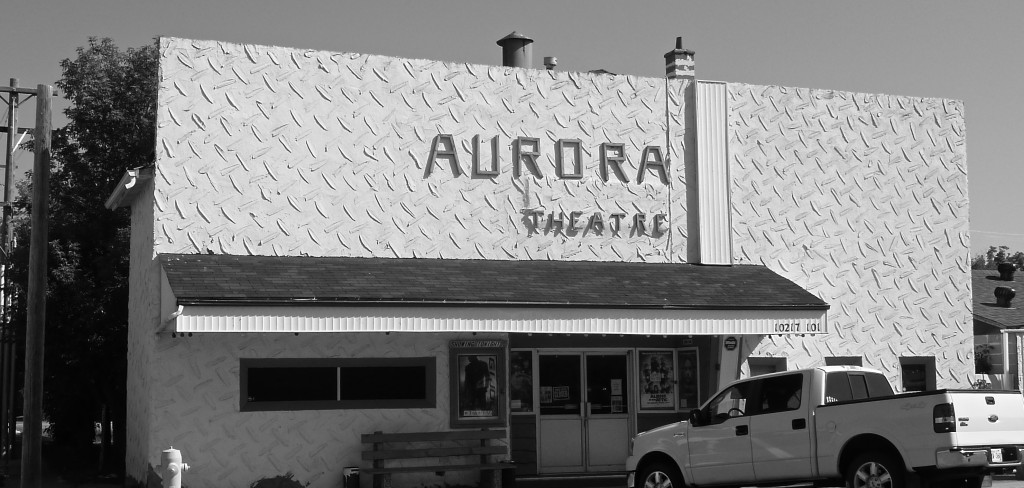
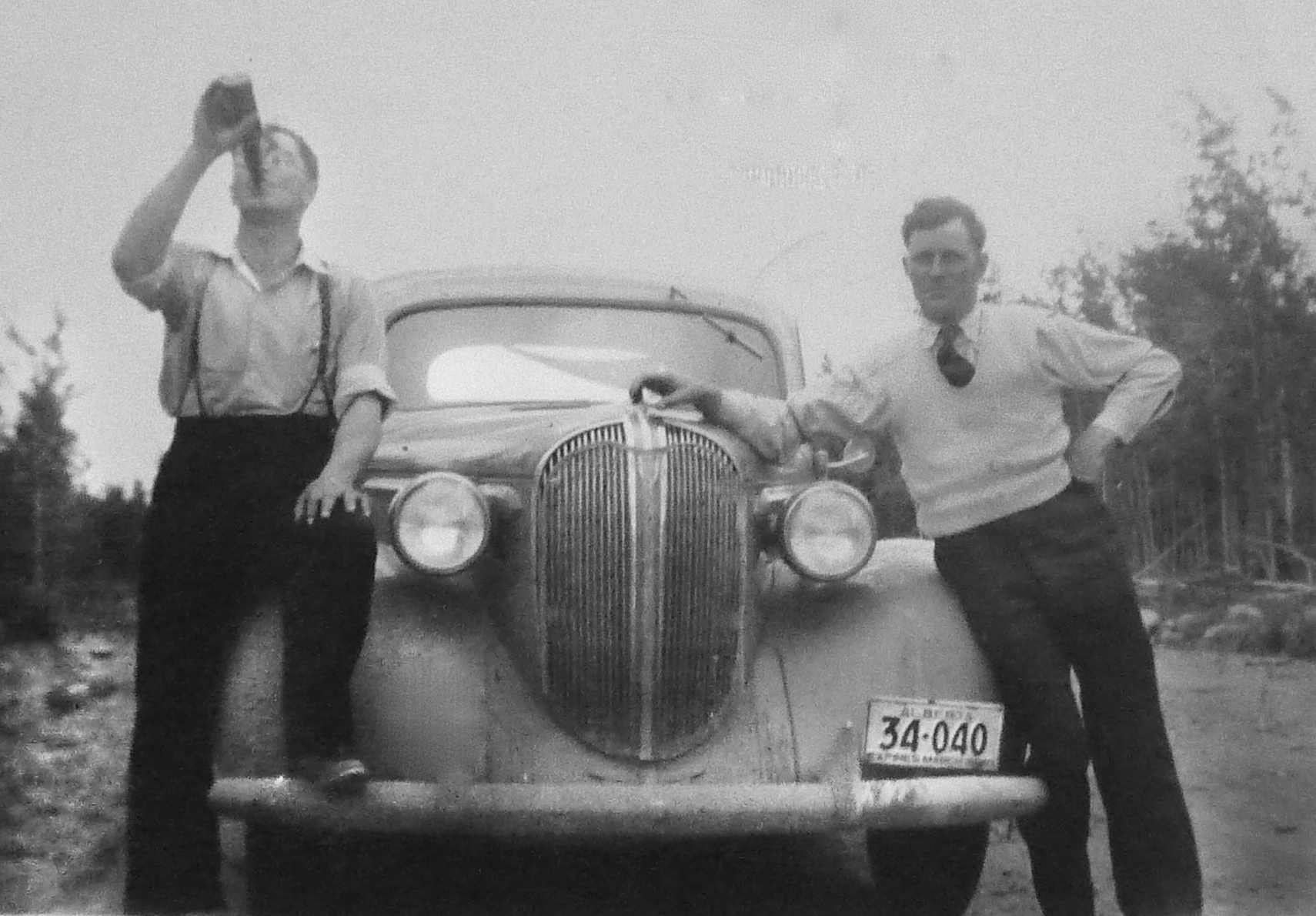
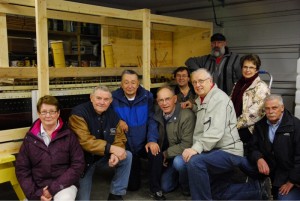
Comments (1)
The following comment from BOB CHERKAS of Nanaimo became attached to the wrong story. It belonged on the LacLaBiche story (reference second half of Chapter 7): Hello again Harold, I was going to include a comment in my previous E-Mail about that girl….and that kiss…Pauline Sampietro. Sadly Pauline, who was a neighbor as well was killed in a car accident many years ago. As I recall she was only about 17 years of age. Lovely girl. I remember her so well….even to this day. She had a sister, Charolette who lives in the Coquitlam area whoo I spoke to a few times over the years but not recently. I know this news about Pauline is unsettling but I felt you should know. I live in Nanaimo and presume you still reside in Victoria. I have an answer to some of my question and now know you are a writter and that skill was certainly evident in my earkier reading of your postings.Regards, Bob